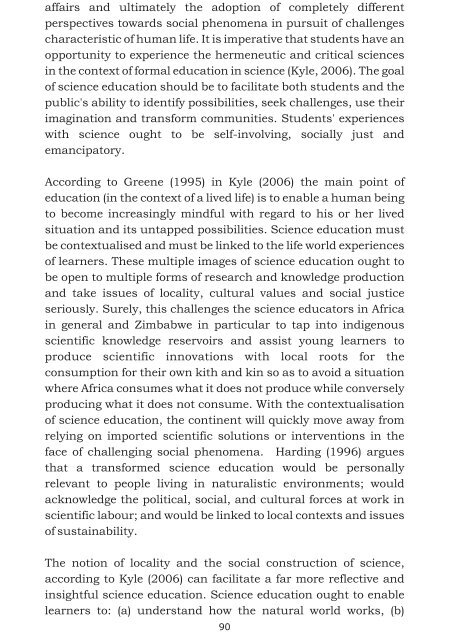Beneficiaries are actors too.pdf - Southern Institute of Peace ...
Beneficiaries are actors too.pdf - Southern Institute of Peace ...
Beneficiaries are actors too.pdf - Southern Institute of Peace ...
You also want an ePaper? Increase the reach of your titles
YUMPU automatically turns print PDFs into web optimized ePapers that Google loves.
affairs and ultimately the adoption <strong>of</strong> completely different<br />
perspectives towards social phenomena in pursuit <strong>of</strong> challenges<br />
characteristic <strong>of</strong> human life. It is imperative that students have an<br />
opportunity to experience the hermeneutic and critical sciences<br />
in the context <strong>of</strong> formal education in science (Kyle, 2006). The goal<br />
<strong>of</strong> science education should be to facilitate both students and the<br />
public's ability to identify possibilities, seek challenges, use their<br />
imagination and transform communities. Students' experiences<br />
with science ought to be self-involving, socially just and<br />
emancipatory.<br />
According to Greene (1995) in Kyle (2006) the main point <strong>of</strong><br />
education (in the context <strong>of</strong> a lived life) is to enable a human being<br />
to become increasingly mindful with regard to his or her lived<br />
situation and its untapped possibilities. Science education must<br />
be contextualised and must be linked to the life world experiences<br />
<strong>of</strong> learners. These multiple images <strong>of</strong> science education ought to<br />
be open to multiple forms <strong>of</strong> research and knowledge production<br />
and take issues <strong>of</strong> locality, cultural values and social justice<br />
seriously. Surely, this challenges the science educators in Africa<br />
in general and Zimbabwe in particular to tap into indigenous<br />
scientific knowledge reservoirs and assist young learners to<br />
produce scientific innovations with local roots for the<br />
consumption for their own kith and kin so as to avoid a situation<br />
where Africa consumes what it does not produce while conversely<br />
producing what it does not consume. With the contextualisation<br />
<strong>of</strong> science education, the continent will quickly move away from<br />
relying on imported scientific solutions or interventions in the<br />
face <strong>of</strong> challenging social phenomena. Harding (1996) argues<br />
that a transformed science education would be personally<br />
relevant to people living in naturalistic environments; would<br />
acknowledge the political, social, and cultural forces at work in<br />
scientific labour; and would be linked to local contexts and issues<br />
<strong>of</strong> sustainability.<br />
The notion <strong>of</strong> locality and the social construction <strong>of</strong> science,<br />
according to Kyle (2006) can facilitate a far more reflective and<br />
insightful science education. Science education ought to enable<br />
learners to: (a) understand how the natural world works, (b)<br />
90


